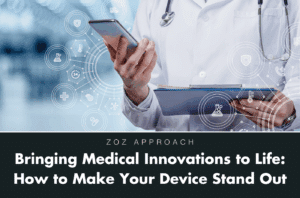In an increasingly competitive healthcare landscape, effective omnichannel marketing is no longer a “nice-to-have”—it’s now as “must do.” As we move into 2025, for healthcare brands to be successful they have to rise to the challenge of delivering seamless, personalized, and compliant experiences across multiple channels to both healthcare providers (HCPs) and patients.
Most important, those channels need to be coordinated and complementary. This article will explore the key issues healthcare marketers face in implementing omnichannel strategies and provide actionable recommendations to build their brand, increase market share, and expand revenue.
The Promise of Omnichannel Marketing in Healthcare
Omnichannel marketing goes beyond simply being present on multiple platforms. Rather, it involves creating a unified and integrated customer experience across channels, ensuring that every interaction—whether online or offline—builds on the last. For healthcare brands, this often means aligning digital ads, social media, email campaigns, in-office materials, press coverage, packaging, and conferences to craft a cohesive journey for HCPs and patients alike.
However, this integration is no easy task. Healthcare marketers face unique challenges, including strict regulatory requirements, siloed data systems, and the need to cater to diverse audiences with varying preferences.
Key Challenges in Healthcare Omnichannel Marketing
Regulatory Compliance
Healthcare marketing is tightly regulated, with strict guidelines around patient privacy (e.g., HIPAA), off-label promotions, and communication transparency. Non-compliance can result in legal penalties and damage to brand reputation.
Siloed Marketing Channels
Many healthcare organizations operate in silos, with separate teams managing digital, field sales, medical affairs, and traditional marketing. This fragmentation can lead to inconsistent messaging or creative and missed opportunities for cross-channel engagement.
Data Integration and Analytics
Healthcare marketers often struggle with integrating data from disparate sources, such as CRM systems, social media platforms, conference attendance, and myriad other sources. Without a unified view, it’s challenging to track the customer journey and measure campaign effectiveness.
Diverse Target Audiences
Healthcare brands engage with a wide range of audience types: HCPs, patients, caregivers, and payers—each with unique needs and preferences. Creating tailored yet cohesive messaging across channels for these varied audiences is a daunting task.
Technological Adaptation
With the rapid evolution of digital tools, marketers must constantly adapt to emerging platforms and technologies, such as AI-driven chatbots, digital marketing privacy regulations, and adopting emerging platforms.
Recommendations for Effective Omnichannel Marketing in 2025
To address these challenges, healthcare marketers must adopt strategies that prioritize integration, personalization, and compliance. Below are actionable steps to achieve this:
Centralize Data for a Unified Customer View
- Integrate Data Sources: Use customer data platforms (CDPs) to consolidate data from CRMs, social media, and website analytics. This unified view allows marketers to track interactions across channels and understand customer preferences.
- Invest in Analytics Tools: The world of analytics goes so far being GA and CRM systems. Leverage AI-powered analytics to identify patterns in HCP and patient behaviors, enabling more precise targeting and segmentation across channels.
Develop Personalized, Patient-Centric Experiences
- Segment Your Audience: Group HCPs and patients based on demographics, conditions, treatment preferences, and behavior patterns. This segmentation allows for targeted messaging that resonates with each audience segment.
- Personalization: Tap into cross-organizational resources to tailor content recommendations, such as sending HCPs clinical trial results aligned with their specialty or offering patients condition-specific resources.
Ensure Consistent and Compliant Messaging
- Create a Centralized Content Repository: Develop a repository of pre-approved, compliant content that can be customized for different channels while ensuring consistency.
- Train Teams on Compliance: Regularly update marketing, sales, and medical affairs teams on regulatory requirements to improve consistency and minimize the risk of non-compliance.
Break Down Silos with Cross-Functional Collaboration
- Establish Integrated Teams: Create cross-functional teams comprising representatives from marketing, medical affairs, sales, IT, and compliance to plan and execute omnichannel campaigns.
- Use Collaborative Platforms: Adopt project management tools to streamline communication and ensure alignment across teams.
Adopt an Agile Marketing Approach
- Test and Optimize Campaigns: Continuously test content, channels, and strategies to determine what works best for your audience. Use A/B testing to refine messaging and delivery. The optimize, optimize, optimize to improve efficiency over time.
- Monitor Trends: Stay ahead of emerging trends, such as voice search optimization and the use of wearable health data in campaigns.
Measure and Optimize ROI
- Define Clear KPIs: Set measurable objectives for each channel, such as HCP engagement rates, patient acquisition costs, or patient expansion metrics.
- Leverage Attribution Models: Use multi-touch attribution to understand how different channels contribute to conversions and adjust your strategy accordingly.
Omnichannel marketing is a powerful strategy for healthcare brands to build their presence, increase engagement, and drive revenue. While challenges like regulatory compliance and data integration may seem daunting and overwhelming, the payoff is game changing. Adopting a strategic, patient- and HCP-centric approach can deliver significant rewards and efficiencies over time.
By centralizing data, personalizing interactions, and leveraging emerging technologies, healthcare marketers can create seamless experiences that not only meet their audiences’ needs but also position their brands as leaders in a competitive industry.
As we navigate 2025, the brands that prioritize omnichannel excellence will not only survive but thrive in a rapidly evolving healthcare landscape.

Nick Lowe
Senior Partner
Nick is focused on building an elite team of experts that can do extraordinary work for our clients. Since founding Zozimus, the agency has grown steadily to a full-service offerings supported by industry veterans and rising stars alike. Nick has spent a lot of time building an organization and structure that can scale, but it’s his involvement in key client projects that makes him most excited.

BOSTON, MA




